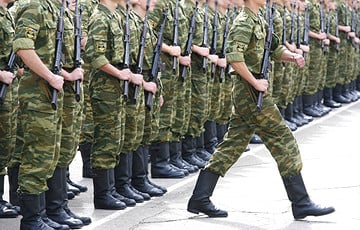Bloomberg: Government Change Or Military Uprising Is Possible In Belarus
20- 18.08.2022, 19:41
- 40,236

Belarusians are dissatisfied with Lukashenka's regime.
Wars that are caused by people can also be caused by deep historical processes. It is enough to look at the war that continues in Ukraine to prove this. That conflict is the doing of Russian President Vladimir Putin, a ruler determined to reassert Russia’s greatness by destroying an independent Ukraine. Yet it is also part of a bigger story about what happens when empires break up.
Professor at Johns Hopkins University’s School of Advanced International Studies Hal Brands writes about this in an article for Bloomberg. The article is also published by the ZN,UA edition.
The fighting in Ukraine is the latest and worst of the wars fought over the remnants of the Soviet Union, an empire whose death throes continue some thirty years after the union itself ceased to exist. It will not, unfortunately, be the last one. The 20th century saw the breaking of the great Eurasian empires that once dominated global affairs. World War I destroyed the Russian, Austro-Hungarian, Ottoman and German empires. World War II eliminated empires ruled by Tokyo, Rome and (once again) Berlin. Later, decolonization finished off the British, French and Portuguese empires. The Cold War killed the Soviet Union, which first lost the countries under its control in Eastern Europe and then disintegrated into 15 independent states.
However, empires don’t die quickly. Their collapse, historian Serhii Plokhy wrote, is a “process rather than an event.” When a vast entity once held together by the iron discipline of the metropole gives way, don’t expect a new, stable status quo to appear in a single day. Ongoing tensions in the Balkans and the Middle East remind us that the legacies of the Austro-Hungarian and Ottoman empires are still working themselves out. The relationship between Britain and its former colonies continues to develop.
The Soviet Union was governed so brutally And that's why its breakup has been particularly messy. The end of the Soviet state removed the strictures that had suppressed ethnic tensions and national rivalries among the empire’s constituent parts. It gave birth to new, politically volatile states. The confrontation between Russia, which dominated the empire, and countries seeking to escape the clutches of Moscow intensified. The result was what scholars have called the “wars of the Soviet succession” — a series of bloody conflicts over contested areas from Eastern Europe to Central Asia.
During the 1990s, wars convulsed Nagorno-Karabakh, Transnistria, Chechnya, Abkhazia, South Ossetia and Tajikistan, often drawing in neighbouring states and international peacekeepers. Some of these conflicts are still exiting at a low level of intensity. Others, such as the war for control of South Ossetia and Abkhazia, reignited into major international conflicts. The end of the Soviet Union was a geopolitical earthquake whose aftershocks destabilize the international system even today.
Ukraine has suffered the most because of these tremors. The current war is distinguished by the ferocity of the fighting and the totality of Putin’s effort to wipe another country off the map. Its most immediate origins can be found in the increasingly totalitarian nature of Putin’s regime, which allows him to be more aggressive while also requiring him to find external enemies. Also, the question of whether Kyiv will align with Moscow or the West affected it. Yet it is also of a piece with the larger post-Soviet upheaval. Ukraine’s declaration of independence in late 1991 helped destroy the Soviet state and accelerate the imperial dissolution that followed. It is thus unsurprising, and sadly symbolic, that Ukraine is at the center of Putin’s effort to reconsolidate the dominance Moscow once possessed.
The war hasn’t gone as Putin planned. Ukraine has defended itself admirably and will long resist being forcibly incorporated into a Russian sphere of influence. Putin’s quest for imperial resurrection has, in this case, turbocharged the formation of Ukrainian nationalism. However, if Russia has paid a high price for its misadventure, that doesn’t mean the wars of Soviet succession are over.
Whenever the Russia-Ukraine conflict ends, the dividing line between the two armies may simply become another contested post-Soviet frontier where frequent tension causes periodic violence. Whether Russia wins or loses, the outcome will shift the balance of power within the former Soviet Union, perhaps causing a re-intensification of old disputes with Moldova, Georgia or other states.
The potential for violence in Central Asia remains high, as shown by an anti-government revolt in Kazakhstan, which precipitated Russian intervention earlier this year. A change of government or military uprising cannot be ruled out in Belarus. Dissatisfaction with the authoritarian regime of Aliaksandr Lukashenka remains high. A fight over that country’s place between Russia and the West could start. In early 1992, one American newspaper warned that the troubles caused by the “still-fragmenting, nuclear-armed shards of the world’s last great empire” were only beginning. Even when the present war is over, that empire’s long, violent afterlife will persist.








